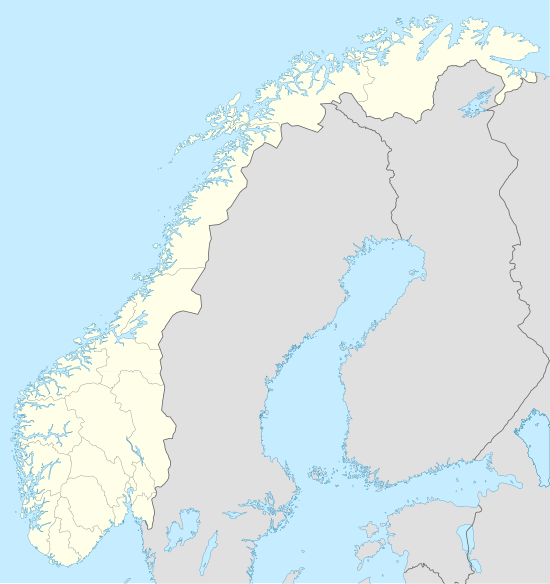Stiklestad
| Stiklestad | |
|---|---|
| Village | |
|
View of the church in Stiklestad | |
 Stiklestad  Stiklestad Location in Nord-Trøndelag | |
| Coordinates: 63°47′46″N 11°33′38″E / 63.79611°N 11.56056°ECoordinates: 63°47′46″N 11°33′38″E / 63.79611°N 11.56056°E | |
| Country | Norway |
| Region | Trøndelag |
| County | Nord-Trøndelag |
| District | Innherred |
| Municipality | Verdal |
| Elevation[1] | 20 m (70 ft) |
| Time zone | CET (UTC+01:00) |
| • Summer (DST) | CEST (UTC+02:00) |
| Post Code | 7650 Verdal |

Stiklestad is a village and parish in the municipality of Verdal in Nord-Trøndelag county, Norway. It is located 4 kilometres (2.5 mi) east of the municipal center of Verdalsøra and about 2 kilometres (1.2 mi) southeast of Forbregd/Lein. The village is mainly known as the site of the Battle of Stiklestad on 29 July 1030. Stiklestad Church is located in the village and it is assumed to have been erected on the exact spot where King Olaf II Haraldsson fell in the battle. The king was buried in Nidaros (Trondheim), was canonised there on 3 August 1031 and was later enshrined in Nidaros Cathedral. Since 1568 St. Olav's grave in Nidaros has been unknown, due to the Lutheran reformation in 1537.
Name
The Old Norse form of the name is Stiklarstaðir. The first element is the genitive of a word stikl and the last element is staðir which means "farm". The word stikl might have been derived from the verb stikla which means "to jump", and this might have been the name of a nearby brook.[2]
Panorama of the area

See also
References
- ↑ "Stiklestad" (in Norwegian). yr.no. Retrieved 2011-07-04.
- ↑ Rygh, Oluf (1903). Norske gaardnavne: Nordre Trondhjems amt (dokpro.uio.no) (in Norwegian) (15 ed.). Kristiania, Norge: W. C. Fabritius & sønners bogtrikkeri. p. 122.